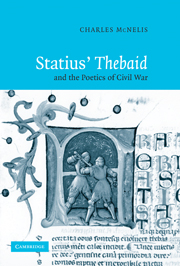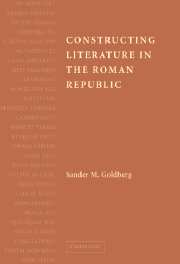
Inconsistency in Roman Epic
Studies in Catullus, Lucretius, Vergil, Ovid and Lucan
Part of Roman Literature and its Contexts
- Author: James J. O'Hara, University of North Carolina, Chapel Hill
- Date Published: April 2007
- availability: Available
- format: Hardback
- isbn: 9780521641395
Hardback
Other available formats:
Paperback, eBook
Looking for an inspection copy?
This title is not currently available for inspection. However, if you are interested in the title for your course we can consider offering an inspection copy. To register your interest please contact [email protected] providing details of the course you are teaching.
-
How should we react as readers and as critics when two passages in a literary work contradict one another? Classicists once assumed that all inconsistencies in ancient texts needed to be amended, explained away, or lamented. Building on recent work on both Greek and Roman authors, this book explores the possibility of interpreting inconsistencies in Roman epic. After a chapter surveying Greek background material including Homer, tragedy, Plato and the Alexandrians, five chapters argue that comparative study of the literary use of inconsistencies can shed light on major problems in Catullus' Peleus and Thetis, Lucretius' De Rerum Natura, Vergil's Aeneid, Ovid's Metamorphoses, and Lucan's Bellum Civile. Not all inconsistencies can or should be interpreted thematically, but numerous details in these poems, and some ancient and modern theorists, suggest that we can be better readers if we consider how inconsistencies may be functioning in Greek and Roman texts.
Read more- Considers the possible function of inconsistent passages in Roman epic poems
- Looks at Roman epic poems in the light of Greek poetic and critical tradition, and suggests that the use of inconsistencies became traditional in Roman epic
- Pulls together a great deal of recent work on Greek and Roman poetry within a brief compass, and with a fresh vantage point
Customer reviews
Not yet reviewed
Be the first to review
Review was not posted due to profanity
×Product details
- Date Published: April 2007
- format: Hardback
- isbn: 9780521641395
- length: 178 pages
- dimensions: 206 x 135 x 10 mm
- weight: 0.304kg
- availability: Available
Table of Contents
Introduction
1. Greek versions
2. Catullus 64: variants and the virtues of heroes
3. Death, inconsistency and the Epicurean poet
4. Voices, variants and inconsistency in the Aeneid
5. Inconsistency and authority in Ovid's Metamorphoses
6. Postscript: Lucan's Bellum Civile and the inconsistent Roman epic.
Sorry, this resource is locked
Please register or sign in to request access. If you are having problems accessing these resources please email [email protected]
Register Sign in» Proceed
You are now leaving the Cambridge University Press website. Your eBook purchase and download will be completed by our partner www.ebooks.com. Please see the permission section of the www.ebooks.com catalogue page for details of the print & copy limits on our eBooks.
Continue ×Are you sure you want to delete your account?
This cannot be undone.
Thank you for your feedback which will help us improve our service.
If you requested a response, we will make sure to get back to you shortly.
×







